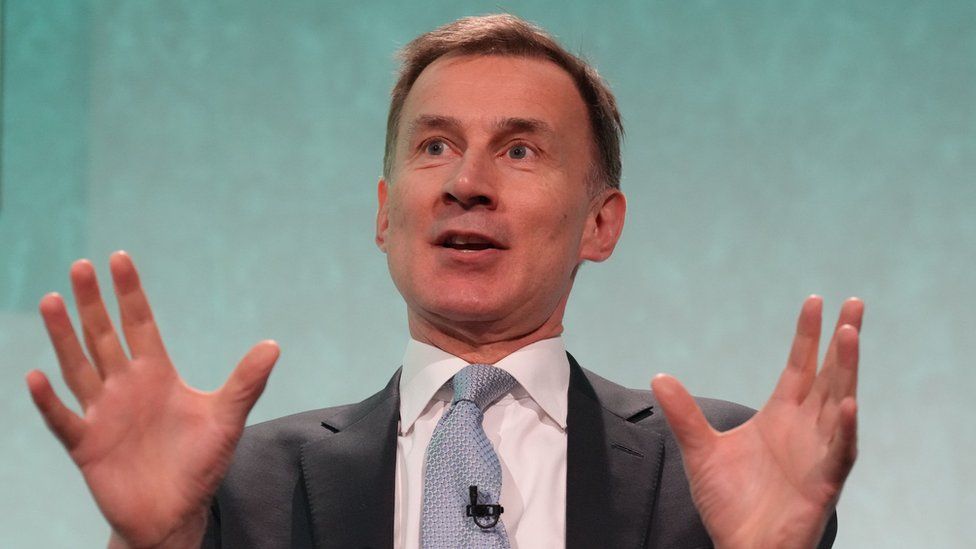30 minutes ago
About sharing
The International Monetary Fund (IMF) has “advised the UK against further tax cuts”, as it launched its latest assessment of the world economy.
It said preserving public services and investment implied higher spending than was reflected in the government’s current plans.
The IMF suggested the Treasury’s planned spending cuts for this year were unrealistic.
Chancellor Jeremy Hunt said tax cuts could be a big help in boosting growth.
Mr Hunt has hinted heavily about more tax cuts in his upcoming Budget in March.
What is the IMF?
The IMF is an international organisation with 190 member countries, including the UK. They work together to try to stabilise the global economy.
One of the Fund’s jobs is to advise its members on how to improve their economies.
The latest comments from the IMF came as it downgraded its forecasts for UK growth next year from 2% to 1.6%, partly as a statistical consequence of growth having been revised higher during the pandemic years. This better performance leaves less room for growth to catch up in later years.
The UK’s growth last year and this year is expected to remain sluggish at below 0.5% and 0.6% respectively, the second slowest in the G7 major economies, behind Germany.
The IMF also assumes fewer Bank of England rate cuts than in financial markets, calculating that rates will remain at 5.25% in the first half of this year. The Bank is then expected to cut by half a per cent over the second half of the year.
Treasury sources said the government was slapping down the IMF for its advice on tax cuts, which derives from the organisation’s research for its annual in-depth health check of the UK economy.
It comes at a sensitive time ahead of the Budget and a general election where the chancellor hopes to mark out a key dividing line with the opposition on a smaller state, with lower public spending and lower taxes. The Treasury sources said that the improvement in UK growth prospects arose because of the chancellor’s targeted business investment tax cuts.
On Tuesday, Mr Hunt receives the first draft of the numbers on the public finances from the Office for Budget Responsibility (OBR) – the government’s independent forecaster – including an indication of the room for manoeuvre that might be used for tax cuts or spending increase.
OBR head Richard Hughes recently said a description of the government’s pencilled in post election spending plans as a “work of fiction” were “generous” because the “government hasn’t even bothered to write down” its plans for individual departments.
If the government sticks to its spending plans, then lower interest rates, and a stronger economy could increase the chancellor’s room for manoeuvre against his self imposed borrowing targets by as much as £20bn per year.
Commenting on the IMF’s advice, Mr Hunt said: “The IMF expect growth to strengthen over the next few years, supported by our introduction of the biggest capital investment tax reliefs anywhere in the world, alongside National Insurance cuts to improve work incentives.
“It is too early to know whether further reductions in tax will be affordable in the Budget, but we continue to believe that smart tax reductions can make a big difference in boosting growth.”
Elsewhere the IMF predicted that the world economy could be on the path to a “soft landing” with lower inflation and more resilient growth.
There was a notably large upgrade to its forecast for growth in Russia, which is turning into a war economy, mobilising vast resources to protect its annexation of large parts of Ukraine.
Related Topics
10 October 2023
31 December 2023
22 December 2023
